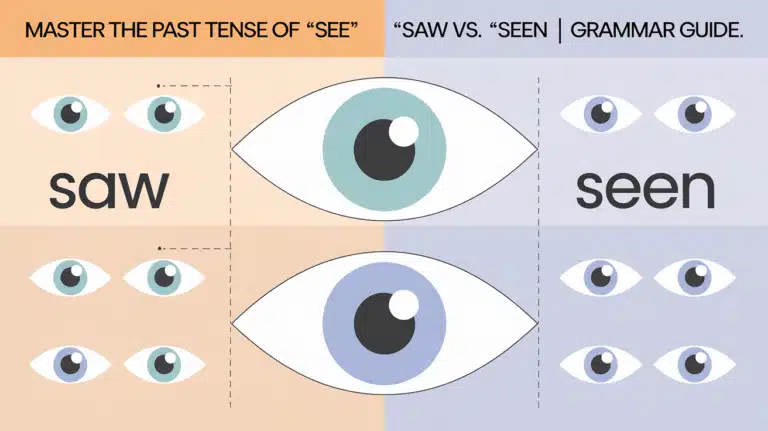“Mastering the Past Tense of ‘Swing'”
Have you ever found yourself in a grammatical pickle, wondering about the past tense of swing? You’re not alone. This seemingly simple verb can trip up even seasoned English speakers. Is it swing, swang, or swung? Let’s dive into the world of verb conjugation and unravel this linguistic mystery once and for all.
The Swinging Debate: Swing, Swang, or Swung?
When it comes to the past tense of “swing,” there’s only one correct answer: swung. Despite what you might have heard on the playground or in casual conversation, “swang” is not a proper past tense form. This confusion stems from the fact that “swing” is an irregular verb, meaning it doesn’t follow the standard “-ed” ending rule for past tense.
Here’s a quick verb tense table to clear things up:
| Tense | Form |
|---|---|
| Present | swing |
| Past | swung |
| Past Participle | swung |
| Present Participle | swinging |
As you can see, “swung” pulls double duty as both the simple past tense and the past participle. This pattern is common among many irregular verbs in English.
Read About : Mastering the Past Tense and Past Participle of “See”: A Comprehensive Guide
The Anatomy of “Swing”
To fully grasp the verb forms of “swing,” let’s break it down:
- Present tense: I swing, you swing, he/she/it swings, we swing, they swing
- Past tense: I swung, you swung, he/she/it swung, we swung, they swung
- Present participle: swinging
- Past participle: (have/has/had) swung
Understanding these forms is crucial for proper verb usage in various contexts.
Mastering Pronunciation
Getting the pronunciation of swing and pronunciation of swung right can be tricky. Here’s a breakdown:
- Swing: /swɪŋ/ – It rhymes with “ring” or “sing”
- Swung: /swʌŋ/ – It rhymes with “hung” or “rung”
Swung pronunciation tips:
- Start with the “s” sound, as in “sun”
- Move to a short “wu” sound, like in “wood”
- End with the “ng” sound, as in “sung”
Practice these pronunciations to avoid common pitfalls and sound more like a native speaker.
The Many Faces of “Swing”
The swing definition goes beyond just the physical act. Let’s explore its various meanings:
- To move back and forth or from side to side while suspended
- To cause to move in a curving or circular path
- To shift or change
- (In music) To play or dance with a fluid, rhythmic motion
Verb usage examples:
- Literal: “The child swung on the playground swing.”
- Figurative: “His mood swings from elation to despair.”
- Idiomatic: “Let’s swing by the store on our way home.”
Swinging Through Time: A Brief Etymology
The origin of swing is as fascinating as its usage. This verb has deep roots in Old English and Germanic languages:
- Old English: “swingan” meaning “to rush, fling oneself”
- Proto-Germanic: “swenganan”
- Related to Old Norse “svingja” and German “schwingen”
Over centuries, the meaning evolved from violent motion to the more graceful movement we associate with swinging today.
Swinging Through Sentences: Usage Examples
Let’s look at some conjugation examples to see how “swing” behaves in different tenses:
- Present: “I swing the bat with all my might.”
- Past: “Yesterday, he swung the pendulum to demonstrate physics.”
- Present Perfect: “They have swung from tree to tree like monkeys.”
- Past Perfect: “By the time I arrived, the wrecking ball had already swung.”
- Future: “Tomorrow, we will swing by the new café.”
These examples showcase the versatility of “swing” and its past tense form “swung” in various contexts.
The Rhythm of Language: “Swing” in Music and Literature
“Swing” has a special place in music and literature:
“It don’t mean a thing if it ain’t got that swing.” – Duke Ellington
This famous quote highlights the importance of “swing” in jazz music, where it refers to a specific rhythmic feel.
In literature, authors often use “swing” to create vivid imagery:
“The old oak tree swung its branches in the wind, as if dancing to an ancient melody.”
Synonyms and Related Words
Understanding synonyms of swing and synonyms of swung can enrich your vocabulary:
Synonyms for “swing” (present tense):
- Sway
- Oscillate
- Fluctuate
- Pendulate
- Rock
Synonyms for “swung” (past tense):
- Swayed
- Oscillated
- Fluctuated
- Pendulated
- Rocked
Each synonym carries its own nuance, so choose wisely based on context.
Common Mistakes and How to Avoid Them
When dealing with the past tense of swing, people often make these mistakes:
- Using “swang” instead of “swung”
- Confusing “swing” with “swung” in perfect tenses
- Mispronouncing “swung”
To avoid these errors:
- Memorize the correct form: swing – swung – swung
- Practice using “swung” in sentences
- Listen to native speakers and mimic their pronunciation
Beyond English: “Swing” in Other Languages
Exploring how other languages express the concept of “swing” can be enlightening:
- French: “balancer” (to swing)
- Spanish: “columpiarse” (to swing oneself)
- German: “schwingen” (to swing)
Interestingly, many languages have similar-sounding words for this action, highlighting the onomatopoeic nature of “swing.”
Conclusion:
Mastering the past tense of swing is just one step in your journey to English proficiency. Remember:
- The correct past tense is “swung,” not “swang”
- “Swing” follows the pattern of other irregular verbs like “ring” (rang) and “sing” (sang)
- Practice makes perfect – use “swung” in various contexts to internalize its usage
By understanding the intricacies of verbs like “swing,” you’re not just improving your grammar; you’re gaining a deeper appreciation for the rhythms and patterns of the English language.
Quiz: Test Your “Swing” Knowledge
- What is the past tense of “swing”?
a) Swing
b) Swang
c) Swung
d) Swinged - Which of these is the correct sentence?
a) He swang the bat with all his might.
b) He swung the bat with all his might.
c) He swinged the bat with all his might.
d) He swing the bat with all his might. - What is the present participle of “swing”?
a) Swinging
b) Swunging
c) Swanging
d) Swinged - In the sentence “By the time I arrived, they _ already _ into action,” which option correctly fills in the blanks?
a) have, swung
b) had, swung
c) had, swang
d) have, swing - Which word is closest in meaning to “swing” in the phrase “swing by the store”?
a) Dance
b) Visit briefly
c) Oscillate
d) Hang
(Answers: 1-c, 2-b, 3-a, 4-b, 5-b)
Remember, language is a living thing that’s constantly in motion. Like a swing, it moves back and forth, evolving and changing. By mastering tricky verbs like “swing,” you’re not just learning grammar – you’re joining a centuries-old linguistic dance. So go ahead, take a swing at it!







